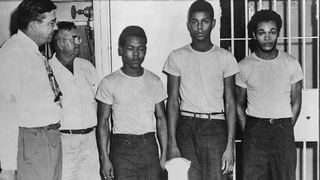
Topics
By Amy Goodman & Denis Moynihan
Four months have passed since the massacre in the Emanuel A.M.E. Church in Charleston, S.C., left nine peaceful parishioners dead. Those bullets allegedly fired by white supremacist Dylann Storm Roof murdered many, but they may also have shot the roof off the Confederacy. Within days of the shooting, Confederate flags were taken down from the Alabama state capitol grounds. They disappeared from the shelves and websites of vendors like Wal-Mart, Amazon and Etsy. After 10 days, African-American activist Bree Newsome climbed the flagpole outside the South Carolina Statehouse, pulled down the flag and was quickly arrested. While the flag was put right back up, it almost took two more weeks for the Republican-controlled South Carolina Legislature to pass a bill, which was then signed into law by the state’s Republican governor, Nikki Haley, removing the battle flag of the Confederacy once and for all from South Carolina’s Statehouse grounds. It had flown there, either on the capitol dome or, later, beside the capitol at the Confederate war memorial, since 1961.
As Roof languishes in prison, awaiting trial on both federal and state felony charges, the movement that was sparked by the massacre continues to grow. Most recently, students at the University of Mississippi in Oxford have been organizing to force the removal from campus of the state flag of Mississippi. That state flag, alone among the 50, retains the actual design of the stars and bars of the Confederate flag. In the upper-left corner of the flag, this symbol of racist violence and secession still flies proudly.
On Tuesday night, the University of Mississippi’s Associated Student Body (ASB) voted on a resolution put forth by one of that group’s senators, a white student named Allen Coon, president of the University of Mississippi College Democrats, to remove the flag. The resolution passed by a vote of 33 to 15, with one abstention. I asked Coon why he took on the issue of the Mississippi state flag:
“After the tragic events in Charleston, there’s been this national movement to address Confederate iconography,” he told me. “Our campus is steeped in symbols of the Confederacy and symbols of white supremacy. I felt we ought to utilize this momentum to address these symbols. So, in late September, I contacted my allies in the NAACP on campus, and we decided to form a coalition and challenge ASB to take a stand.”
The resolution was supported by the campus NAACP, whose chapter president, Dominique Scott, told me, “We want to institutionalize inclusion here at the university.” The University of Mississippi was at the center of the civil-rights movement. In 1962, James Meredith became the first African-American to enroll there as a student, eight full years after the U.S. Supreme Court formally overturned all school segregation laws. President John F. Kennedy deployed the military to keep order; white segregationists rioted when Meredith entered the campus.
Even the university’s name is freighted with racism. The University of Mississippi is popularly referred to as “‘Ole Miss.” Scott explained the history of the nickname:
“Historically, the term ‘Ole Miss’ is a term that slaves used to refer to the mistresses or matriarchs of their plantations. When the school was deciding on [its] nickname, one woman was quoted saying that ‘Ole Miss’… used to refer to the mistress of their plantations. When the vote was passed to use the term ‘Ole Miss,’ the runner-up was ‘Ole Massa.’ The term is steeped within a history of white supremacy and racial oppression.”
Racism is still all too present on campus. As Scott recalled, “In 2013, three individuals placed a noose around the neck of the James Meredith statue with the old Georgia state flag. They shouted racial slurs and ‘white power,’ in a way to intimidate black students on campus.” At the rally on campus to support the ASB resolution to remove the flag, a group of white supremacists staged a counter-rally, carrying the Confederate flag and shouting racist slogans.
University officials say they are proud of the stand the students are taking. But, as a state institution, the university says it is bound to fly the official state flag, though they encourage the state government to change it. Scott finds the official stance “cowardly.” Already, at least three other universities in Mississippi have taken down the flag, along with the cities of Greenwood and Oxford. Jackson, the state capital, is expected to follow soon. Allen Coon seconded the concern: “It’s a nonbinding resolution … the senior leadership of the university has the opportunity to listen to our voices, but we’ve been receiving indications that they may not necessarily take the flag down. … We may have to do more.”
Education is a two-way street. The chancellor of the University of Mississippi should learn from his students: take the flag down now.












Media Options